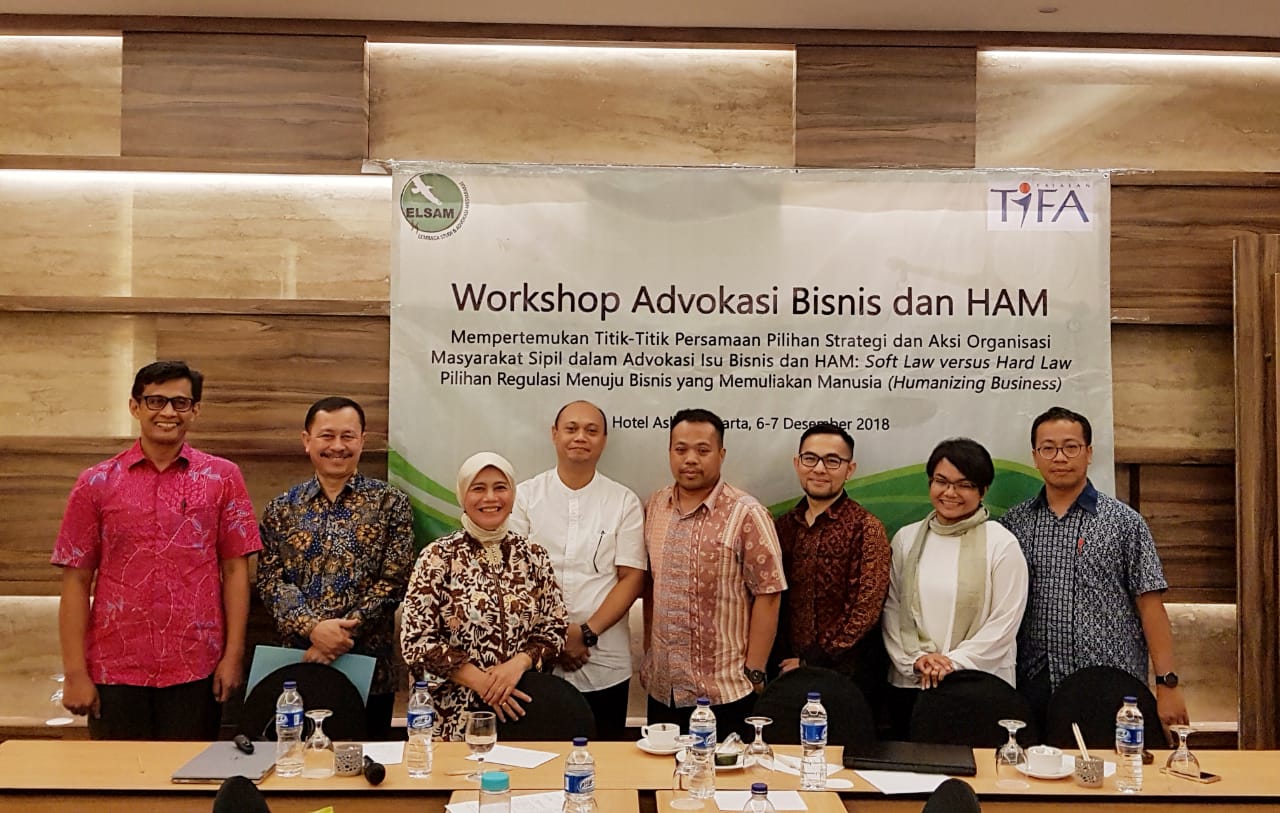UNAIR NEWS – Two civil society organizations that encourage respect for law and human rights in Indonesia, Tifa Foundation and Elsam (Institute for Community Studies and Advocacy), have just held a Business and Human Rights Advocacy Workshop on Friday, November 6 and Saturday, November 7. The event which was held at Ashley Hotel in Jakarta invited the Head of International Law Department of Faculty of Law, UNAIR, Iman Prihandono, Ph.D, as the speaker. There was also the Head of National Human Rights Commission, Ahmad Taufan Damanik and a representative from Directorate of Human Rights and Humanity of Indonesian Ministry of Foreign Affairs. This activity was held as an effort to develop an advocacy strategy by civil society groups in Indonesia on business and human rights issues.
As we all know, in 2011, UN Human Rights Council approved United Nations Guiding Principles on Business and Human Rights(UNGPs) resolution. This guide provides guidance on how human rights violations in corporate business activities can be reduced and avoided. The UNGPs encourage the implementation of three pillars, protect, respect, and remedy. UNGPs have provided many guidelines for drafting legislation by the state, such as Dodd Frank Act in the United States; Modern Slavery Act in the United Kingdom, and Duty of Care Act in France. All of these rules demand human rights reports and audits to prevent human rights violations in their business operations.
But at the same time several developing countries including Indonesia, supported the international agreements to ensure victims of human rights violations by corporations get effective recovery. In June 2018, Ecuador as the head of drafting group issued a Draft Instrument for Binding Business and Human Rights. The issuance of this draft seems to be able to change human rights advocacy strategies in corporate business activities.
According to Iman, the lack of recognition for corporations as subjects in international law makes corporations submit to national law. At the moment there are no international human rights law instruments that provide direct obligations to corporations to respect human rights.
“Because there is no international legal personality by corporations, respect for human rights by business is done in three ways. First, voluntary instruments formed by corporations. second, semi-binding instruments made by countries or international organizations. Third, the national law of each country, “he said.
The issuance of a Legally Binding Instrument (LBI) gives hope for victims in gaining access to justice.
“Although LBI does not provide legal personality to corporations, LBI ensures courts in the home country of the corporation and state courts where the corporation runs its business to have jurisdiction to examine cases of human rights violations by corporations,” explained Iman.
Meanwhile, Ahmad Taufan Damanik, stressed that corporations will continue to be the most non-state actor reported as human rights violators. Therefore an advocacy strategy needs to be carried out through various mechanisms, both court, mediation and other available methods.
Representatives of Indonesian Ministry of Foreign Affairs’s Directorate of Human Rights and Humanity said that Indonesia is involved actively in the preparation of the LBI. In ASEAN region, Indonesia together with Malaysia participated in negotiations on business and human rights issues. Because, both have similarities in human rights issues by business such as, migrant workers, human trafficking, slavery and oil palm.
As a closing statement, Iman said that the UNGPs and LBI should not be collided with each other. Both provide a way to respect for human rights in business by corporations.
“All parties, including the government, civil society groups, business people, affected communities and academics must sit together to ensure respect for human rights by corporations,” he said.
Author: Zanna Afia Deswari
Editor: Nuri Hermawan





